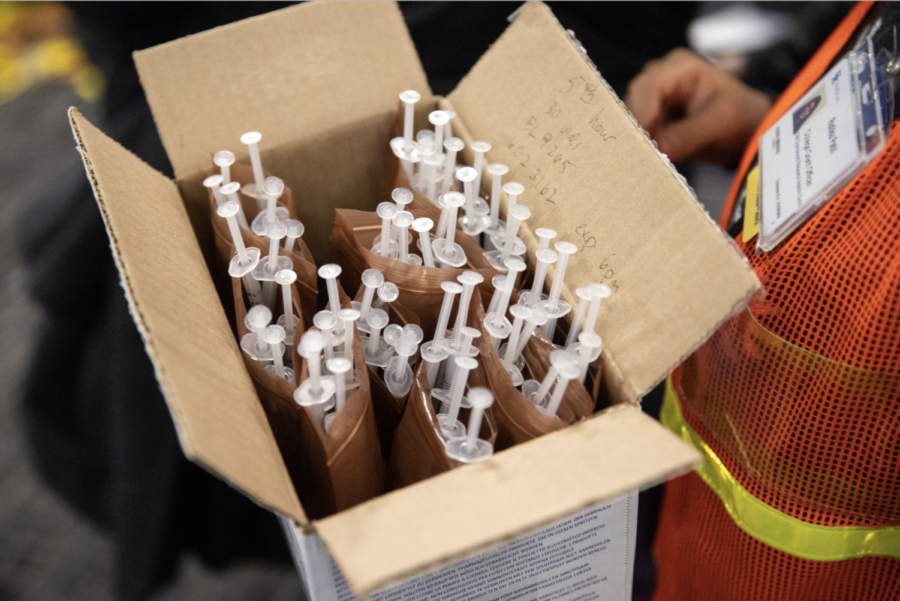UK pauses use of Johnson & Johnson vaccine
A box of COVID-19 vaccines is carried to vaccine stations on Saturday, Jan. 30, 2021, in Lexington, Kentucky. Photo by Jack Weaver | Staff
April 13, 2021
The University of Kentucky will temporarily halt administration of the Johnson & Johnson COVID-19 following a call from U.S. health agencies.
The CDC and FDA called for the pause out of an “abundance of caution” after six cases of a rare blood clot were reported nationwide. Nearly 7 million doses of the Johnson & Johnson vaccine have been administered in the U.S.
“This is important, in part, to ensure that the health care provider community is aware of the potential for these adverse events and can plan for proper recognition and management due to the unique treatment required for this type of blood clot,” said the joint statement from the CDC and FDA.
The six cases were reported among women between the ages of 18 and 48. According to the CDC, the symptoms emerged between six and 13 days after vaccination of the single dose shot.
One woman died and a second is in critical condition. The incidence rate of the clotting issue is less than one in a million, lower than the risk of clotting from many oral contraceptives and the rate of COVID-19 cases in the U.S.
UK has administered more than 400 doses of the Johnson & Johnson vaccine after opening walk-up clinics at two COVID-19 testing sites on campus for two days last week.
Freshman journalism major Caroline Paddock received the Johnson & Johnson vaccine on Thursday, April 8 at K-Lair.
“It’s definitely scary whenever something goes wrong with a vaccine that’s supposed to prevent a virus that I never even got,” Paddock said.
However, Paddock said she’s not worried because only six cases of blood clots have been reported.
“I will definitely keep a watchful eye over my own health for the next two to three weeks,” Paddock said.
Matthew Logsdon, a junior chemical engineering major, recently had COVID-19 and is waiting to receive a vaccine.
“Based on what I heard this morning, I don’t think I’m going to hop on the Johnson & Johnson train,” Logsdon said. “I’d opt for Pfizer if it’s available, and I’d probably wait until the Pfizer is available if not.”
Junior chemical engineering student Jonathan Smith received the Pfizer vaccine at Kroger Field before the Johnson & Johnson vaccine was offered to students. Smith is glad he did not receive the Johnson & Johnson vaccine instead.
The university planned to operate a more regular Johnson & Johnson vaccine site in the Gatton Student Center beginning the same day the CDC called for providers to stop use of Johnson & Johnson.
The CDC met on Wednesday, April 13 to evaluate the cases and their significance. The agency estimates they will have a decision in a week, maintaining the halt on administering the doses in the meantime.
The federal government has ceased the use of the Johnson & Johnson shot at its federal vaccine sites and called on states to do the same.
According to the CDC, the states have roughly nine million doses of the Johnson & Johnson vaccine in addition to the millions administered.
UK will continue vaccinations at their Kroger Field and other sites, which use the Pfizer and Moderna vaccines.
Gov. Andy Beshear announced that Kentucky will halt its use of the Johnson & Johnson vaccine, noting that the clots were very rare.
“Understand that these are six people who have serious side effects out of 6.8 million,” Beshear said.
He called on Kentuckians to go through with their vaccine appointments for the other vaccines so Kentucky can meet the goal of 2.5 million residents vaccinated.
“We have very little J&J vaccine in Kentucky compared to the Pfizer and Moderna vaccines,” said Beshear, and Pfizer and Moderna are “entirely safe.”
Beshear estimated that fewer than 5 percent of Kentuckians received the Johnson & Johnson vaccine. Kentucky has received 210,00 doses of Johnson & Johnson.
All of the state’s mass vaccination sites use Pfizer or Moderna, so the pause will not have a huge effect on the state’s vaccine rollout. Independent pharmacies, pop up events and outreach to homeless and incarcerated populations will take the biggest hits.
The Lexington-Fayette County Health Department canceled an April 16 vaccine clinic due to the pending review of the Johnson & Johnson vaccine.
To Beshear’s knowledge, no clotting issues have been reported in Kentucky. State medical commissioner Dr. Steven Stack said at a Tuesday press conference that Kentuckians who are more than four weeks out from their Johnson & Johnson shot are safe from this very rare clotting problem.
All of the six victims experienced their first symptoms within a week of their vaccine. But, Beshear said, symptoms like a fever and a headache are common after any vaccination.
A regulatory pause like the one recommended by the CDC and FDA is common and a sign that the surveillance systems are working as intended. Federal agencies will review the six cases and possibly issue updated recommendations for the vaccine.




















































































































































